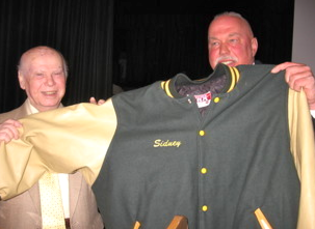 They met at a crime scene, the cop and the tailor, a Holocaust survivor. A year later, the cop lured the tailor to a Catholic high school to describe the death camps — then surprised him with an honorary diploma and a varsity football jacket.
They met at a crime scene, the cop and the tailor, a Holocaust survivor. A year later, the cop lured the tailor to a Catholic high school to describe the death camps — then surprised him with an honorary diploma and a varsity football jacket.
The tailor, Sidney Glucksman, received his Notre Dame High School honorary diploma and a jacket with “Sidney” embroidered on it during an assembly Wednesday morning. The tailor said he would wear it on every holiday for the rest of his life.
The tale that brought Glucksman to recall his childhood in death camps, and which riveted 700 Catholic high school boys at Notre Dame’s gymnasium, begins with a shooting committed on Chapel Street in the West River neighborhood a year ago, and with a sense of terror remembered. Glucksman has run a shop there for decades, remaining on a block (which now bears his and his wife’s name) over changing times.
That day a year ago Glucksman met Lt. Leo Bombalicki (who has since become the district manager of the Whalley, Edgewood , Beaver Hill, or “WEB,” district).
Bombalicki, a 1973 Notre Dame graduate, was investigating the shooting. A liquor store owner was shot during a robbery and nearly killed.
Arriving on the scene, Bombalicki noticed an elderly couple nearby on the street: Glucksman, a friend of the victim, and his wife Libby had witnessed the shooting from across the street from their shop on Chapel Street.
“I saw them,” said Bombalicki (pictured her with Notre Dame history teacher Richard Antonelli), by way of introducing Glucksman to the assembly, “and they were clutching each other very tightly. I reassured them that the crime, which was horrific, was a rare thing, and it wouldn’t happen again.”
A friendship was formed.
“From then on we became close. We talked regularly on the beat, and I learned Sidney’s story in the Holocaust that you’re about to hear now. He was taken away when he was 12 years old, survived two concentration camps and saw pure terror.”
“So what you are about to hear is no video game where you push buttons,” said the no-nonsense cop. “This is a rare opportunity for you to hear testimony about pure terror and that will remind you always to remember your Notre Dame code, Now, listen closely and learn.”
During Bombalicki’s visits to the tailor shop over the past year, the pair discovered they had much in common, beyond the crime that touched them both.
“We’ve become like family,” said Glucksman.
Bombalicki’s family is from Poland. His grandparents were born in Cracow. just 28 kilometers from Chraznow, Glucksman’s small town, from which he was abducted along with hundreds of other young Jewish children in the fall of 1939 after the German invasion.
“My father, Leo — we’re all Leos —” Bombalicki went on, “lived on Atwater Street, went to Fair Haven Middle School, and then Commercial High, and he just loved flying. He spent his lunch money on model planes. By the time World War Two came, he was ready to fly. He joined the Free Polish Air Force and then when the U.S. entered the war he joined the U.S. Army Air Force.”
Glucksman (pictured with his daughter Jeanie Horwitz) listened carefully. “My dad,” Bombalicki, a self-confessed history aficionado, went on, “flew 30 missions, with 8th Air Force, 446th bomber group, 707th squadron. He was a waist gunner and mechanic. The final mission one was on D‑Day.”
“You know,” Glucksman said, placing his hand on Bombalicki’s arm, “I remember the allied bombers flying over the camps. They were like silver flickers in the sky. They never hit us, but the nearby installations. Afterwards, there were German soldiers’ heads, severed by the bombs. They made us clean them up.”
Glucksman finished his presentation with recollections of babies dashed against walls, of being forced to sort the clothes and bag the shaven hair of Jews about to be sent to the gas chambers. He remembered how small were the eyeglasses left behind by some of the children.
Then he turned to a reporter: “I never know how much to say. I need to tell what happened, but I don’t want to give these children nightmares.”
The Notre Dame boys gave Glucksman was a standing ovation. But that wasn’t all.
Lt. Bombalicki came up to the stage and prevented Glucksman from sitting down. He had something in hand.
“You know,” he addressed Glucksman and the teens before him, “Leo never had a chance to go to high school, or to go to a prom. He was taken away from his parents at 12 and never saw them again.
“So here,” he said, presenting Glucksman with his jacket. “You’re now an honorary Notre Dame football player.”
Bombalicki was followed by Brother James Branigan, president of the school. He presented Glucksman with the honorary diploma. “You have fulfilled the prescribed course of study,” said Branigan, “and then some. We can and have learned from you.”
Glucksman, a man who has learned to control his emotions, was teary eyed. “These things are worth thousands, millions of dollars to me,” he said. “You will never know.”
Bombalicki, who played defensive end and linebacker for Notre Dame, asked Glucksman how many years of eligibility he had. He suspected his friend did not understand the football terminology.
But Glucksman was already busy fielding questions from Robert Weitzel, a Notre Dame senior, who had lingered afterwards with his class. Weitzel wanted to know if Glucksman in his six years in the camps until liberation in May 1945 had encountered any German SS who were sympathetic to the Jews.
In his handsome new Notre Dame jacket, Glucksman told him no.